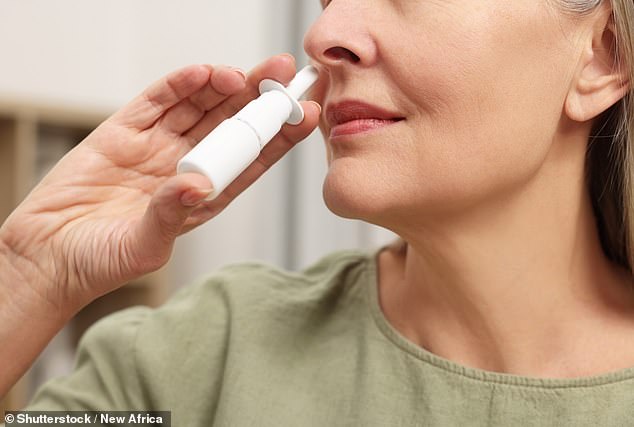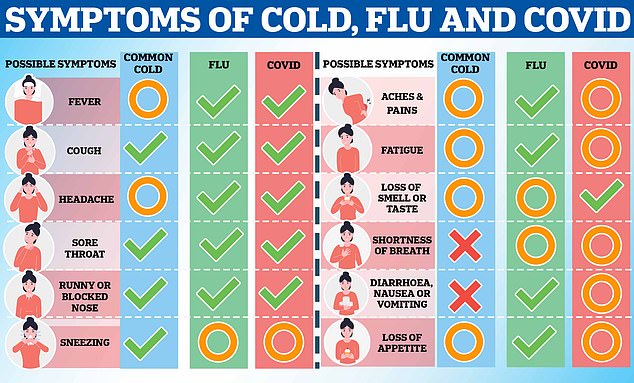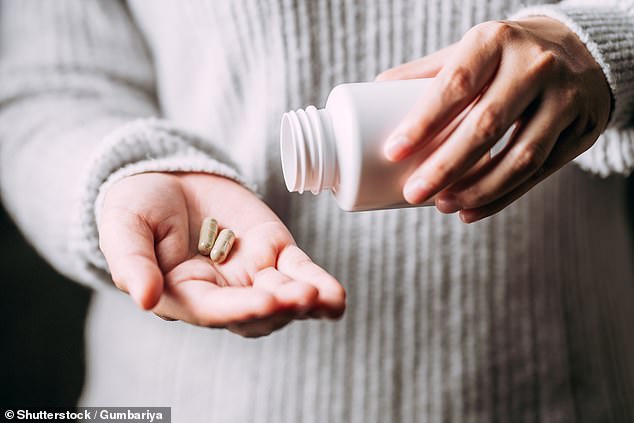So, you have a nasty cold, sore throat, or annoying cough and you want to get rid of it as quickly as possible.
You’re not alone: around one in 250 people are thought to have a cold at any time in the UK, and across the Atlantic in the US, it’s estimated that people get one billion colds every year. .
Unfortunately, there is no way to cure the common cold. But there are some simple methods to not only relieve your symptoms but also potentially reduce the duration of your illness.
Here, Professor Ron Eccles, bioscience expert at Cardiff University and former director of its Common Cold Centre, shares the best ways to not only fight a cold but shorten it in record time.
One in 250 people are thought to have a cold at any given time in the UK and an estimated one billion people get a cold in the US each year.

The spray, which is also sold as ‘Double Defense Nasal Spray’ in Boots for £6, is applied directly into the nasal passage and is an effective way to shorten the duration of a cold.
Professor Eccles recommends several over-the-counter remedies to make pesky colds more bearable, but one he sticks to is a nasal spray.
But not all these sprays are the same. He suggests using products containing carragellose and kappa-carrageenan, which are extracted from seaweed, within the first 48 hours after symptoms appear.
“It’s of no use when you have severe symptoms; you have to take it within 24 to 48 hours at most,” Professor Eccles told MailOnline.
‘The sooner you take it, the better, because it has antiviral action. The problem is, once viruses start to really trigger symptoms, it’s a cascade that just continues. “It can’t be stopped,” he added.
The seaweed extracts used in nasal sprays act as an antiviral agent, helping to form a protective barrier that prevents viruses and allergens from spreading further throughout the body, reducing the overall duration and severity of the cold.
Other nasal sprays have also shown promise.
A 2024 study Involving almost 14,000 British adults, two types were tested: one that used a saline liquid to reduce virus levels and another that used a microgel to trap the viruses, neutralize them in the nose and prevent them from spreading.
The results, published in the journal Lancet Respiratory Medicine, showed that both sprays reduced the duration of the illness by about 20 percent. Which means the participants weren’t sick for that long.
But if you miss the chance to use a spray, don’t lose hope – Professor Eccles said managing the symptoms of a cold can be as good as getting rid of the virus itself.
“If you can get rid of the symptoms, you don’t worry about the virus, your immune system will get rid of it on its own.” But if you control the symptoms, you’ll basically get rid of the cold,” he said.

Shows common symptoms (green checkmark), occasional and possible symptoms (orange circle) and symptoms that never occur (red cross) with the common cold, flu and Covid.

Professor Eccles explains that a hot sweet drink works because it promotes salivation, which soothes the throat.
A hot sweet drink, such as a cup of honey with lemon or blackcurrant, is a simple way to relieve cough and sore throat symptoms.
Professor Eccles explained that this drink works because it promotes salivation, which soothes the throat.
For flu-like symptoms, such as headache, fever, chills or muscle aches, he suggested taking acetaminophen.
Finally, to treat nasal congestion, he urges people to use a nasal decongestant spray that contains the chemicals oxymetazoline or xylometazoline.
“That will open your nose and allow you to sleep well at night, because you can’t sleep with a stuffy nose,” he added.
However, people can also take proactive steps to not only reduce the duration of illness if they catch a cold, but also to prevent infection in the first place by keeping their immune system healthy.
Professor Eccles said simply eating a balanced diet of fresh fruit and vegetables, as well as doing gentle exercise such as walking, is enough to keep the immune system working well.
But there are also numerous supplements and remedies that promise to relieve cold symptoms.

A Cochrane Library review found that taking small doses of zinc supplements for a few days could be helpful in reducing the duration of a cold.

Orange juice is full of vitamin C, and while it’s a common belief that drinking it will help keep you healthy and prevent a cold, experts say that’s not the case. However, there is a small chance that it will speed up your recovery.
One of them is zinc, a vital mineral and essential for the development of the cells that make up the immune system.
As a result, there is some suggestion that taking a zinc supplement could help the body fight common colds.
A Cochrane Library review found that taking small doses of 10 to 40 mg of zinc supplements for a few days could be helpful in reducing the duration of a cold.
The mineral is found naturally in red meat and dairy products and most people can get all the zinc they need from their diet alone.
Although taking supplements can help boost your zinc levels, the NHS recommends avoiding taking more than 25mg of zinc a day, as too much can cause gastrointestinal problems and even weaken your immune system.
Vitamin C, another essential vitamin that helps regenerate and repair body tissues and can also help shorten a cold.
Adults need about 40 mg of vitamin C daily, half the amount found in a standard glass of orange juice.
One review A study supporting taking vitamin C to combat colds, published in the American Journal of Lifestyle Medicine in 2016, found that data “show reduced severity and duration of colds when vitamin C is consumed in equal or higher doses at 0.2 g/day”.
Other reviewPublished last year, researchers from the Australian National University and the University of Helsinki found that vitamin C reduced the severity and duration of cold symptoms.
But the NHS says there is little firm evidence that vitamin C prevents colds or speeds recovery.
Vitamin D is another supplement that could help you fight a cold.
It is found in foods such as oily fish, red meat, egg yolks and also in direct sunlight, vitamin D. They help regulate the amount of calcium and phosphate in your body, two vital nutrients for keeping bones, teeth, and muscles healthy.
But according to According to the National Institute for Health and Care Excellence (NICE), which provides health advice and guidance to the NHS, vitamin D could play a role in the immune system’s response to respiratory viruses, including the common cold.
Therefore, taking vitamin D could keep your immune system in shape.
Although we can get enough vitamin D from our diet and sunlight for most of the year, we may run out of it from October to early March as daylight hours begin to decrease in the colder months.
The NHS advises that everyone should consider taking a supplement containing 10 micrograms of vitamin D every day during autumn and winter.
An American supplement brand, called EZC pack, which sells for around £30 a box, combines vitamin D, vitamin C and zinc in a supplement that it says will provide “immune support”.
But Professor Eccles said there is no need to burn a hole in your pocket by buying supplements.
‘I don’t think it’s useless. “It’s just not worth paying that much money, you can buy vitamin D in your supermarket brand,” he said.
He added: “I have taken vitamin D, especially during the winter, and it is quite cheap.” But of course people believe they are getting more effective vitamins. I don’t think it’s worth paying a lot of money when vitamins can be found for free in supermarket brands.’

